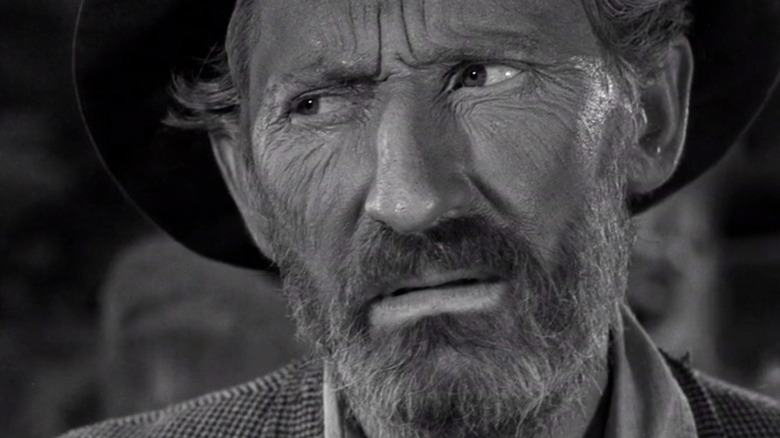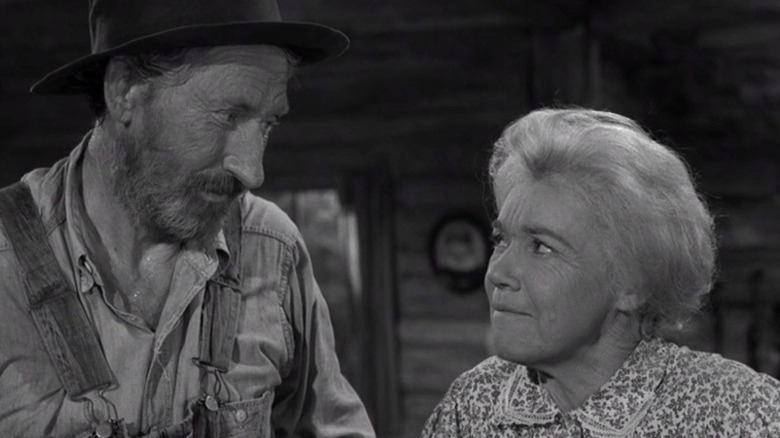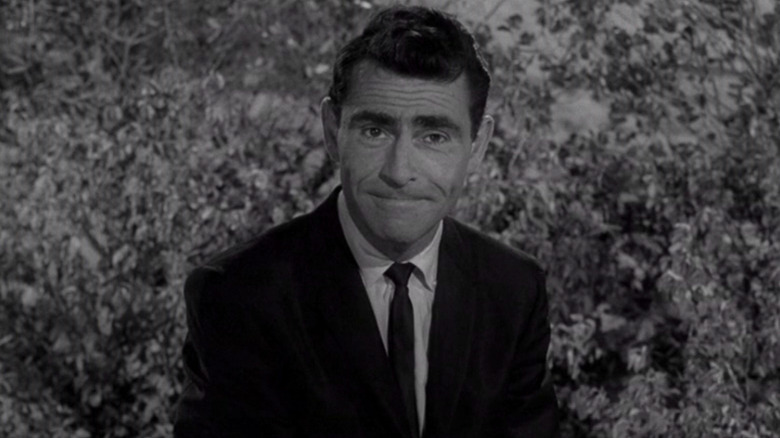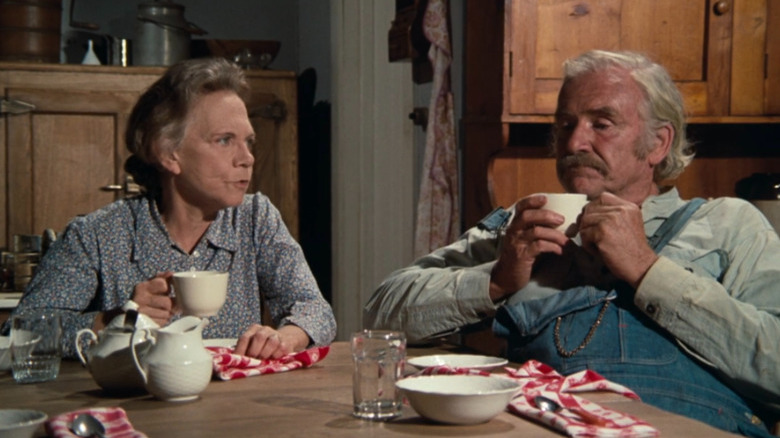How One Of The Twilight Zone's Worst Episodes Eventually Became The Waltons
Every episode of the classic sci-fi/horror anthology "The Twilight Zone" begins with the introduction of some seemingly normal people, usually in the midst of a seemingly normal day. What they don't realize, of course, is that this will be the day they encounter the strange, the fantastic, and sometimes the horrifying. And just as they begin their journey, the camera pans over to a man in a respectable suit. He looks directly at the audience and explains who these people are, exactly what troubles them (or is about to), and reveals that they are about to enter — you guessed it — "The Twilight Zone."
Exactly what "The Twilight Zone" is, is never made clear. Episodes of the classic series often take place in the real world as we know it, but also sometimes in the distant future, or the distant past, or on other planets, or in the afterlife. They don't clearly connect together, and some episodes seemingly contradict the others, so perhaps "The Twilight Zone" isn't so much a place as it is a general, ethereal vibe. It can enchant you or terrify you, and is a space in which anything is possible ... and everything usually has an ironic twist.
Whatever "The Twilight Zone" is, it's certainly a big place with a lot of people and worlds within it, and those people don't live in a vacuum. Indeed, one elderly couple residing within "The Twilight Zone" managed to escape and find their way into another classic television series: "The Waltons."
Ghost dog: way of the nice old guy
Our tale begins with "The Hunt," episode 84 of "The Twilight Zone," and the first written by Earl Hamner, Jr., who would go on to write seven more episodes of the hit series. "The Hunt" stars Oscar-nominee Arthur Hunnicutt ("The Big Sky") as Hyder Simpson, an old man living in the mountains with his beloved wife Rachel (Jeanette Nolan, who also provided the voice of Norma Bates in "Psycho"), and his beloved dog, Rip.
Rachel tells Hyder that she's seen bad omens lately, but Hyder ignores her warnings and goes out hunting with Rip in the middle of the night. They chase a raccoon into a river, and they never come out again. But their souls wake up on dry land, completely unaware that they've died, and begin wandering back home, oblivious to the obvious telltale signs of their fate, like their neighbors digging a grave on their land. It's only when Hyder finds Rachel wearing black, watching as his coffin is removed from their cabin, that he finally puts two-and-two together.
Hyder and Rip begin wandering a lonely road and run across a man guarding a gate, who says Hyder is welcome to come in and join the crowd in heaven. There's just one catch: Rip isn't invited. Hyder says that heaven just wouldn't be heaven without dogs so he decides to live in purgatory forever instead. Eventually, another traveler finds him and says Hyder was nearly tricked by the devil: "You see, Mr. Simpson, a man, well he'll walk right into Hell with both eyes open. But even the Devil can't fool a dog!"
Isn't that nice? That's a sweet little story. Some people hate this episode. I think they're jerks.
The Virginian spring
Yes, even Marc Scott Zicree's indispensable tome "The Twilight Zone Companion" has harsh words for "The Hunt," calling it "naive, badly directed, only tolerably acted." (Zicree praises Jeanette Nolan's performance, at least.) It's a sentiment I've heard elsewhere but I would argue instead that the episode is, atypically for "The Twilight Zone" perhaps, simply gentle. A little sad, extremely reassuring, and ultimately very kind.
How fitting, then, that "The Hunt" eventually led directly to the classic TV drama "The Waltons," another reassuring and kind-hearted classic television series. Earl Hamner, Jr. was raised in the Appalachian Mountains and used his familiarity with the region and its dialects to create the characters of Hyder and Rachel. But although he wrote the episode with an air of realism, the finished episode rang false to him, especially the performance of Arthur Hunnicutt, who he claims played the role "too seriously."
"He should have had fun with the role rather than treating it so literally," Hamner recounts in Zicree's book. "It required a kind of homespun, tongue-in-cheek approach because the idea of a hillbilly angel immediately imposes a certain kind of fun. You know, 'Let's relax, this is a romp!'"
Spring, summer, Waltons, winter ... and spring
10 years after "The Hunt," Earl Hamner, Jr. created a television series called "The Waltons," which was also based on his experiences growing up, albeit with fewer angels and demons and ghosts. Based on Hamner's 1961 book "Spencer's Mountain" — which had already been adapted into a film in 1963 starring Henry Fonda and Maureen O'Hara, and directed by Delmer Daves ("Dark Passage") — "The Waltons" tells the story of a family enduring life's many foibles in Virginia throughout the Great Depression and World War II. After its debut as the TV movie "The Homecoming: A Christmas Story," the show aired for 221 episodes over the course of nine seasons and was followed by six made-for-TV sequel movies.
To say "The Waltons" was a monster is to undersell it, but so was "The Twilight Zone," and the two are linked by more than just Hamner's name. The characters of Grandma and Grandpa Walton were, according to the writer, the same characters from "The Hunt." "The similarity is not accidental," Hamner says in "The Twilight Zone Companion." "Because at that time I was working on a series of short stories called 'The Old Man and the Old Woman.' Those characters which I used in 'The Hunt' also were later to become the Grandma and Grandpa Walton people."
So the next time you go walking in rural Virginia, watch where you're going because you might find yourself in the world of "The Waltons," but you might also find yourself in ... "The Twilight Zone."



